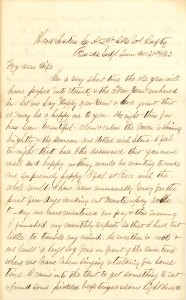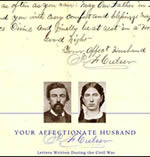 [google-map-v3 width=”400″ height=”300″ zoom=”12″ maptype=”hybrid” mapalign=”right” directionhint=”false” language=”default” poweredby=”false” maptypecontrol=”false” pancontrol=”false” zoomcontrol=”true” scalecontrol=”falso” streetviewcontrol=”false” scrollwheelcontrol=”false” addmarkermashupbubble=”false” addmarkerlist=”36.52354; -86.501849{}1-default.png” bubbleautopan=”true” showbike=”false” showtraffic=”false” showpanoramio=”false”]
[google-map-v3 width=”400″ height=”300″ zoom=”12″ maptype=”hybrid” mapalign=”right” directionhint=”false” language=”default” poweredby=”false” maptypecontrol=”false” pancontrol=”false” zoomcontrol=”true” scalecontrol=”falso” streetviewcontrol=”false” scrollwheelcontrol=”false” addmarkermashupbubble=”false” addmarkerlist=”36.52354; -86.501849{}1-default.png” bubbleautopan=”true” showbike=”false” showtraffic=”false” showpanoramio=”false”]
Head Quarters, Co. A, 129th Ills. Vols. Infty.
Bucks Lodge, Tenn. Dec. 31st 1862
My Dear Wife
In a very short time the old year will have passed into eternity & the “New Year” ushered in. Let me say “Happy New Year,” & God grant that it may be a happy one to you.
The night thus far has been beautiful, clear and calm; the moon is shining brightly & the Heavens are dotted with Stars. I feel to-night that had I the assurance that you were well and happy, nothing would be wanting to make me supremely happy. I feel at Peace with the whole world.
I have been unusually busy for the past few days making out Muster & pay rolls. To-day we were mustered for pay, & this evening I finished my monthly reports so that I had but little to trouble my mind.1
The weather is cool, & we built a large log fire in front of the Quarters where we have been singing & talking for some time. I came into the tent to get something to eat & found some pickeled beef’s tongue & some light Bread just out of the oven with some good Tennessee butter. The bread Capt. Hoskins got baked by a young lady not far from Camp, & the same family promised to let me have some buttermilk & Yeast to-morrow morning. So you see we are trying to live.
We have engaged a new cook, Henry Fisher, who used to live at Mrs. Camp’s at Odell.2 Sid [Arnold] will go home as soon as we can raise money to send him. He has got tired &, I think, homesick.
Lieut. Smith is almost well but will not be permitted to go out for several days yet. The measles are almost dried up. We buried Otis Taylor this morning, & I wrote to his Father last night. Kenyon is getting worse & will not probably recover. He is a noble fellow, & I feel exceedingly sorry to lose him.
By the Nashville papers of to-day, we learn that some 18 miles of the Rail Road has been torn up, and it will take several weeks to repair it.3 In the meantime we shall get but little mail, I presume.
The boys are having considerable fun around the Quarters trying to sell each other. I expect all will have a good time to-morrow if we do not get orders to move. I believe nothing has been heard from Pontiac for ten days or two weeks. There are several citizens here from Scott County, Ills. who intended to go home to-day, but are not going till tomorrow.
I hope S. Bennett has got home by this time so that you may have an opportunity of hearing from me. It is now almost midnight, the close of the old year. What the new year has in store for us as individuals, what joys & fears, trials & encouragement remains to us undeveloped. Let us try & prepare our hearts by calling upon God for assistance. We have the blessed assurance that a sufficiency of grace will be supplied.
God has been pleased to bless us abundantly. As far as I know, neither disease or excessive troubles have taken hold upon us. The first half of it [the year] has been replete with pleasure, &, though during the last few months we have had some trials, yet God has abundantly blessed. Let us live then in the hope of usefulness in the future that whenever or wherever our Master may call our work may be done and well done.
I shall live in the hope of hearing from you soon. I half expected E. R. Maples might get here by to-day. Communication is still open by water to Bowling Green, Ky., & from there by Rail Road through this place to Nashville, Tenn., though no mails are sent by that route.4 I understand it takes some five days to go by water.
We learn but little of the movement of the Army here. Tomorrow is the commencement of a new era in the History of the War unless Lincoln has modified his proclamation.5 I tremble for the results. We have thousands of Tennessee & Kentucky troops in this branch of the service, & should they refuse to fight we might be overwhelmed with superior numbers. I confess that to honestly express myself, I do not like the idea of giving over the reconstruction of the government upon the constitutional basis, yet under my oath I shall fight under any approved policy. I have seen an instance of this new policy to me trying & disgusting, the way is or will be open for large abuses of power. Let us hope God will be with us & control the affairs of the Nation. I should like just now to read the Northern sentiment.6
Give my love to all the family & remember me kindly to all our friends. Hoping that the richest of Heaven’s blessings may rest upon you, for which I shall ever pray, I subscribe myself as ever.
Your affect. Husband
J. F. Culver
- Colonel Smith, at 2 P.M. on the 31st, had reviewed and inspected the regiment, when it was mustered for pay. Smith to Case, Dec. 31, 1861, Regimental Papers, 129th Illinois, NA. [↩]
- Mary Camp was the wife of Edgar Camp, a 38-year-old Odell farmer. In 1860 the Camps were living with their three children. It has been impossible to further identify Henry Fisher, other than that he had worked on the Camp’s farm. Eighth Census, Livingston County, State of Illinois, NA. [↩]
- This refers to damage done the Louisville & Nashville Railroad by Morgan’s cavalry. [↩]
- With the Louisville & Nashville Railroad out of operation between Bacon Creek and the Muldraugh’s Hill, lightdraft steamboats were pressed into service and ascended the Green and Barren Rivers to Bowling Green. There they were unloaded and supplies destined for Rosecrans’ army loaded on railroad cars. O. R., Ser. I, Vol. XX, pt. II, pp. 275, 291, 296. [↩]
- The Confederate states having ignored his preliminary proclamation of Sept. 22, 1862, President Lincoln on January 1, 1863, issued his Emancipation Proclamation, declaring that “all persons held as slaves” within certain designated “states, and parts of states, are henceforward” free. [↩]
- J.F.C., as a constitutional lawyer and Democrat, questioned President Lincoln’s use of his war powers to effect such a sweeping economic and social change. Like most people from the “Old Northwest,” Culver was fighting for preservation of the Union, and if slavery was to be abolished it should be done by a constitutional amendment, not an executive proclamation. The Northern press was divided in its views. Pro-administration editors supported the president, while those in the opposite camp agreed with the New York Herald, “While the Proclamation leaves slavery untouched where his decree can be enforced, he emancipates slaves where his decree cannot be enforced. Friends of human rights will be at a loss to understand this discrimination.” Sandburg, Abraham Lincoln, The Prairie Years and the War Years, pp. 345-346. [↩]

 Subscribe via RSS
Subscribe via RSS Subscribe via Email
Subscribe via Email